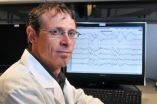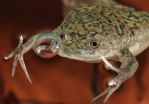(Press-News.org) Researchers from Cardiff University are opening up a new way of using hydrocarbon feedstocks to make a range of valuable products.
Hydrocarbons are an extremely important energy resource but, although widely available from fossil fuels, are extremely difficult to activate and require very high temperatures in current industrial processes.
For the first time, the Cardiff study has shown that the primary carbon-hydrogen bonds in toluene, a hydrocarbon widely used as an industrial material, can be activated selectively at low temperatures.
Professor Graham Hutchings FRS, one of the study's co-authors and Cardiff University's Pro Vice-Chancellor for Research, said: "One of the key challenges facing chemists today is to activate primary carbon-hydrogen bonds in hydrocarbons to make more valuable and reactive molecules. This is crucial for the sustainable exploitation of available industrial feedstocks.
"Our research resulted in unprecedented yields of a single product of over 90%. We achieved this using a gold catalyst, an unexpected result as gold is the most noble of the elements."
This opens up the possibility of using hydrocarbon feedstocks in a new way to form intermediates and final products for use in the chemical, pharmaceutical, and agricultural business sectors.
The research was carried out by a large team at the Cardiff Catalysis Institute, in collaboration with researchers at Lehigh University, Pennsylvania. It was funded by a major research grant won by Cardiff University's School of Chemistry in 2008, when it was selected from hundreds of international bids as part of the Dow Methane Challenge.
The challenge was initiated by the Dow Chemical Company to identify collaborators and approaches in the area of methane conversion to chemicals.
INFORMATION:
The paper, 'Solvent-Free Oxidation of Primary Carbon-Hydrogen Bonds in Toluene Using Au-Pd Alloy Nanoparticles', is published in the most recent edition of Science.
Cardiff scientists make hydrocarbon breakthrough using gold catalyst
2011-01-14
ELSE PRESS RELEASES FROM THIS DATE:
Cancer survivors likely to experience pain at some point in care: U-M study shows
2011-01-14
ANN ARBOR, Mich. – Surviving cancer may also mean surviving pain, according to a study by the University of Michigan Health System showing 20 percent of cancer survivors at least two years post diagnosis have current cancer-related chronic pain.
The study, published online ahead of print in the American Cancer Society's journal Cancer, gives new insight on issues in cancer survivorship among the growing number of U.S. cancer survivors.
More than 40 percent of patients surveyed had experienced pain since their diagnosis, and the pain experience was worse for blacks ...
Popular sleep medicine puts older adults at risk for falls, cognitive impairment
2011-01-14
Adults who take one of the world's most commonly prescribed sleep medications are significantly more at risk for nighttime falls and potential injury, according to a new study by the University of Colorado at Boulder.
The study, which involved 25 healthy adults, showed 58 percent of the older adults and 27 percent of the young adults who took a hypnotic, sleep-inducing drug called zolpidem showed a significant loss of balance when awakened two hours after sleep. The findings are important because falls are the leading cause of injury in older adults, and 30 percent of ...
International Planck mission peels back layers of the universe
2011-01-14
(Santa Barbara, Calif.) –– Planck –– an international satellite that peers back into the beginning of the universe –– has produced what scientists are calling new and provocative data. The satellite is a European Space Agency mission with significant contributions from NASA.
On Tuesday, the Planck mission released a new data catalog with initial maps of the entire sky. The catalog includes thousands of never-before-seen dusty cocoons where stars are forming, and some of the most massive clusters of galaxies ever observed.
"Encoded in the Planck maps is an enormous ...
Women with false-positive mammograms report high anxiety and reduced quality of life
2011-01-14
Doctors are calling for women to receive more information about the pitfalls of breast cancer screening, as well as the benefits, after some women who received false-positive results faced serious anxiety and reduced quality of life for at least a year.
A study published online by BJS, the British Journal of Surgery, shows that patients with false-positive results - where the mammogram is abnormal but no cancer is present - had to undergo more diagnostic procedures than women with breast cancer before they were given the all clear.
Researchers from The Netherlands ...
Cosmic magnifying glasses could shed light on the origin of the Universe
2011-01-14
The first gravitational lens, a phenomenon in which light from a distant object is bent around a massive foreground object, was discovered in 1979 by a team led by Dr. Dennis Walsh from The University of Manchester's Jodrell Bank Observatory.
Since then, astronomers have used gravitational lenses in many ways, including studying dark matter and as "Nature's Telescope" to investigate galaxies in the distant universe.
In a letter to the journal Nature, Professor Shude Mao of The University of Manchester, along with Stuart Wyithe (University of Melbourne), Haojing Yan ...
The microbes in our gut regulate genes that control obesity and inflammation
2011-01-14
If you are looking to lose weight in the coming year, you may need help from an unexpected place: the bacteria in your gut. That's because scientists have discovered that the bacteria living in your intestines may play a far more significant role in weight loss and gastrointestinal problems than ever imagined. In a new research report published online in The FASEB Journal (http://www.fasebj.org), researchers show that a deficiency of Toll-like receptor 2 (Tlr2)—used by mammals (including humans) to recognize resident microbes in the intestines—leads to changes in gut bacteria ...
Inventions of evolution: What gives frogs a face
2011-01-14
"Don't be a frog!" people say in jest when someone hesitates instead of acting straight away. However to be called a frog should actually be a reason to strengthen one's self-confidence. After all frogs are real winners – at least from the point of view of evolutionary biology: Nearly 6.000 species are known today. "In terms of numbers frogs are superior to all the other amphibians, and even mammals", says Professor Dr. Lennart Olsson from the Friedrich Schiller University Jena (Germany). Professor Olsson's research group for Systematic Zoology examines these animals's ...
Is 'breast only' for first 6 months best?
2011-01-14
Current guidance advising mothers in the UK to exclusively breast feed for the first six months of their baby's life is being questioned by child health experts on bmj.com today.
The authors, led by Dr Mary Fewtrell, a consultant paediatrician at the UCL Institute of Child Health in London, have reviewed the evidence behind the current guidance and say the time is right to reappraise this recommendation.
The researchers stress that while they fully back exclusive breast feeding early in life, they are concerned that exclusively doing so for six months and not introducing ...
Taking more steps every day can help ward off diabetes
2011-01-14
Simply taking more steps every day not only helps ward off obesity but also reduces the risk of diabetes, finds a study published on bmj.com today.
While several studies have shown that physical activity reduces body mass index and insulin resistance - an early stage in the development of diabetes - this is the first study to estimate the effects of long-term changes in daily step count on insulin sensitivity.
A popular guideline is to do 10,000 steps every day, though a more recent recommendation is 3,000 steps, five days a week.
The research, by the Murdoch Childrens ...
Virus might fight brain tumors better if armed with bacterial enzyme, study shows
2011-01-14
COLUMBUS, Ohio – New research shows that oncolytic viruses, which are engineered to destroy cancer cells, might be more effective in treating deadly brain tumors if equipped with an enzyme that helps them penetrate the tumor.
The enzyme, called chondroitinase, helps the cancer-killing virus clear its way through the thickets of protein molecules that fill space between cells and impede the virus's movement through the tumor, say researchers at the Ohio State University Comprehensive Cancer Center-Arthur G. James Cancer Hospital and Richard J. Solove Research Institute ...


